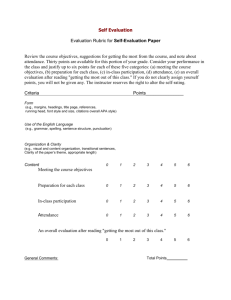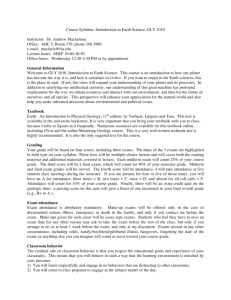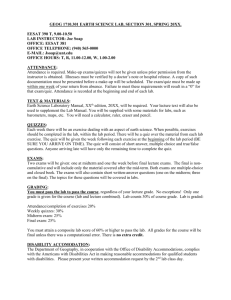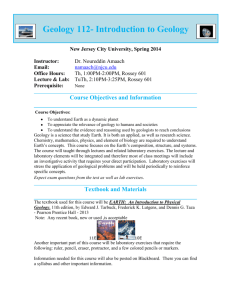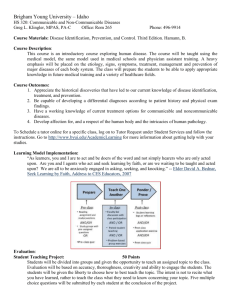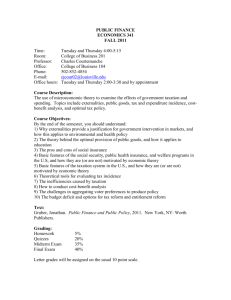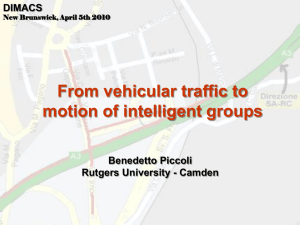GEOL 100: Physical Geology (Spring 2006)
advertisement
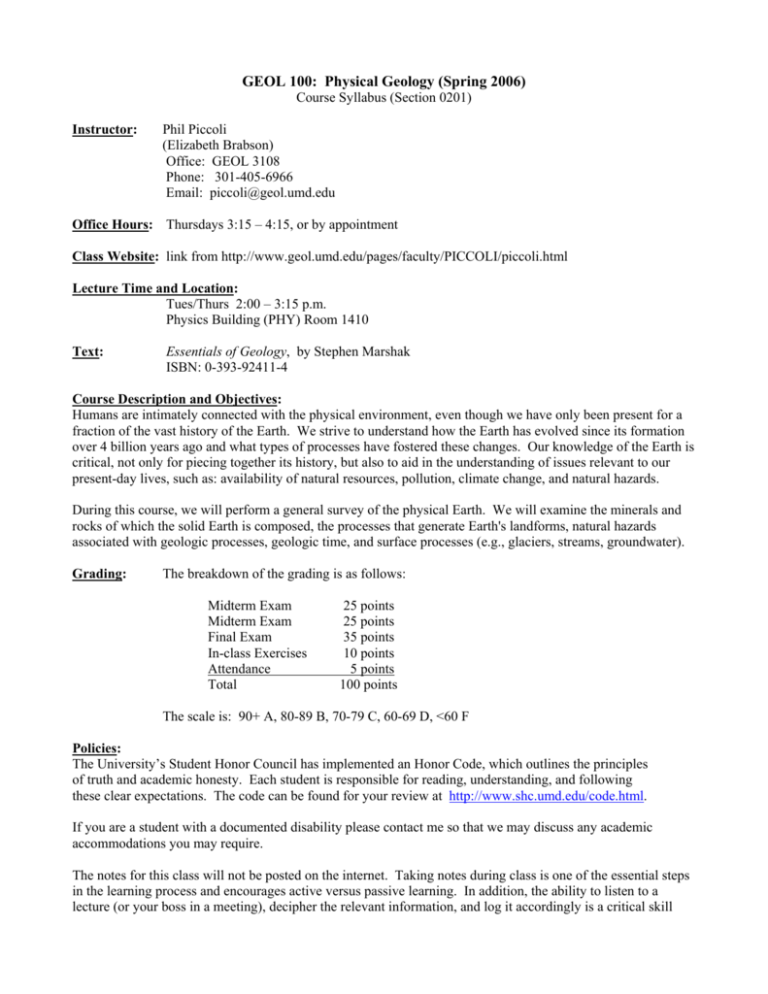
GEOL 100: Physical Geology (Spring 2006) Course Syllabus (Section 0201) Instructor: Phil Piccoli (Elizabeth Brabson) Office: GEOL 3108 Phone: 301-405-6966 Email: piccoli@geol.umd.edu Office Hours: Thursdays 3:15 – 4:15, or by appointment Class Website: link from http://www.geol.umd.edu/pages/faculty/PICCOLI/piccoli.html Lecture Time and Location: Tues/Thurs 2:00 – 3:15 p.m. Physics Building (PHY) Room 1410 Text: Essentials of Geology, by Stephen Marshak ISBN: 0-393-92411-4 Course Description and Objectives: Humans are intimately connected with the physical environment, even though we have only been present for a fraction of the vast history of the Earth. We strive to understand how the Earth has evolved since its formation over 4 billion years ago and what types of processes have fostered these changes. Our knowledge of the Earth is critical, not only for piecing together its history, but also to aid in the understanding of issues relevant to our present-day lives, such as: availability of natural resources, pollution, climate change, and natural hazards. During this course, we will perform a general survey of the physical Earth. We will examine the minerals and rocks of which the solid Earth is composed, the processes that generate Earth's landforms, natural hazards associated with geologic processes, geologic time, and surface processes (e.g., glaciers, streams, groundwater). Grading: The breakdown of the grading is as follows: Midterm Exam Midterm Exam Final Exam In-class Exercises Attendance Total 25 points 25 points 35 points 10 points 5 points 100 points The scale is: 90+ A, 80-89 B, 70-79 C, 60-69 D, <60 F Policies: The University’s Student Honor Council has implemented an Honor Code, which outlines the principles of truth and academic honesty. Each student is responsible for reading, understanding, and following these clear expectations. The code can be found for your review at http://www.shc.umd.edu/code.html. If you are a student with a documented disability please contact me so that we may discuss any academic accommodations you may require. The notes for this class will not be posted on the internet. Taking notes during class is one of the essential steps in the learning process and encourages active versus passive learning. In addition, the ability to listen to a lecture (or your boss in a meeting), decipher the relevant information, and log it accordingly is a critical skill that will go with you into your future endeavors. Attendance is required for this course. There will be random in-class quizzes to gauge attendance, as well as encourage punctuality. Quizzes will be given either during the first 5-10 minutes of lecture OR the last 5-10 minutes of lecture. Quizzes will generally take 5 minutes or less. If you arrive after the papers are being handed in, you will not be permitted to take the quiz and will receive a zero for that quiz. To prepare for quizzes, you should complete the assigned readings before class (see Lecture Schedule). Please note that attendance will be a quantitative portion of your grade. Each time attendance is taken; this will count as one of your attendance points. Coming to class is an easy way to get 5 free points in the course (and could make the difference between that ‘A’ or ‘B’). You are expected to be in the lecture hall, seated, and ready to begin class at 2:00. This requires that you arrive to class a few minutes early. When you arrive to class late, this is not only disruptive to the lecture, but it is disrespectful to your fellow classmates. Please take this into consideration when planning your daily schedule. Repeated tardiness will be reflected in the attendance portion of your grade. Make-up exams will only be permitted for those absences approved by University policy (see www.testudo.umd.edu/soc/atedasse.html). If you know ahead-of-time that you may miss a class, it is best to contact me as soon as possible. Make-up exams must be completed within one week of the original exam, unless there are extenuating circumstances. Be prepared to bring the required documentation for your absence. Simply telling me you were sick will not be sufficient. If you miss a lecture, you will either need to get the notes from a classmate or come to my office hours to review the slides. I will not give out electronic versions of the lectures. The instructor reserves the right to adjust the course schedule as the needs of the class may warrant. The instructor will notify the class of any changes during lecture and via the course webpage. Students missing lecture are personally responsible for determining if there has been an adjustment in the class schedule. In the event the University is closed (due to inclement weather or other circumstances), the schedule will simply be shifted forward one class. For example, if classes were cancelled on the day of an exam (say, a Tuesday), the exam would be held during the next scheduled class meeting (for this example, Thursday). There will be three in-class midterm exams and one comprehensive final exam. Your lowest midterm exam score will be dropped. Please note, however, that you are highly encouraged to take all three midterm exams. You cannot drop the final exam score! The final exam will be comprehensive, but will be weighted towards the material from the last 6 lectures. Review sheets will be made available for each exam at the course website. Exact dates for midterm exams and the final exam can be found on the Lecture Schedule. Students are encouraged to look over exams once they are returned. Any exam questions to be contested must be done so within 7 days of exams being returned to the class. Throughout the course there will be various in-class exercises that you will complete in groups. For each exercise, each group will hand in a sheet with the names of the group members and their responses. For these exercises, you will not always be graded on the accuracy of your answers, but more for how much thought you have put into the responses. Please note that if you skip lecture, you not only lose the attendance points, but you will also lose the exercise points. THERE ARE NO MAKE-UP EXERCISES! There will be an optional field trip to Great Falls, VA sometime in April (date to be announced later). In order to attend, you need to reserve a space and pay a small fee (usually around $10). Extra credit up to 15% of an exam score will be awarded to participants. Please note, this will be the ONLY opportunity for extra credit during this course. Additional information regarding the field trip will be given at a later date. Please note that this course fulfills a CORE Physical Science Course requirement ONLY when taken concurrently with GEOL 110 (Physical Geology Lab). The GEOL 110 laboratory course is graded separately from the lecture on attendance, exercises, and exams with policies and procedures being determined by your Teaching Assistant. GEOL 100: Physical Geology (Spring 2006) Lecture Schedule (Section 0201) Date January February March April May 26 31 2 7 9 14 16 21 23 28 2 7 9 14 16 21 23 28 30 4 6 11 13 18 20 25 27 2 4 9 11 Topic Course Overview Earth In Context Plate Tectonics Plate Tectonics Geologic Time Minerals *** Exam I *** Igneous Rocks Igneous Rocks Sedimentary Rocks Sedimentary Rocks In-Class Exercise Metamorphic Rocks *** Exam 2 *** (note change of date) Volcanic Hazards & Video Spring Break!! Spring Break!! Volcanoes Earthquakes (Problem Set) Crustal Deformation & Mtn Building Crustal Deformation & Mtn Building Streams and Floods Groundwater *** Exam III *** Oceans and Coasts Glaciers Climate Change Climate Change Chesapeake Bay Video Energy Resources Course Wrap-up Reading Chapter 1 Chapter 2 Chapter 2 Chapter 10 Chapter 3 Chapter 4 Chapter 4 Chapter 5 Chapter 5 Chapter 6 Chapter 7 Chapter 7 Chapter 8 Chapter 9 Chapter 9 Chapter 14 Chapter 16 Chapter 15 Chapter 18 Chapter 19 Chapter 19 Chapter 12 Final Exam: Wednesday, May 17th 10:30 – 12:30

